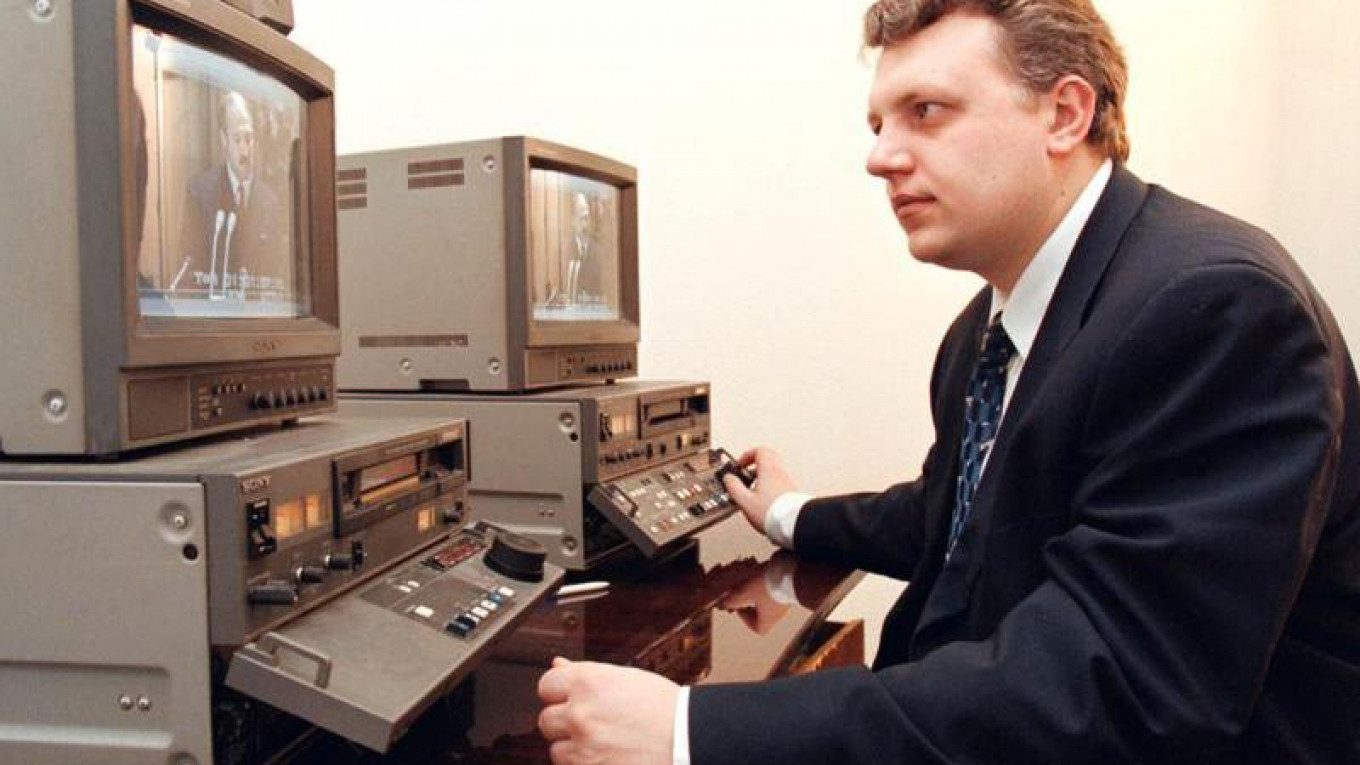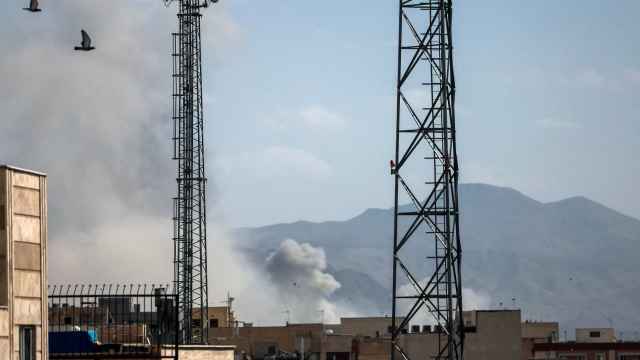A car bomb has killed renowned Belarusian journalist Pavel
Sheremet in the Ukrainian capital. He was 44 years old.
Sheremet became a well-known journalist whilst reporting for Russian television in Belarus in the 1990s. He then went on to make documentaries in the 1990s and eventually left Russian state television in 2008 over increased censorship. He worked as a journalist in Ukraine since 2011, mostly for Ukrainska Pravda. He also co-founded and wrote for Belorussky Partizan, an opposition website focused on his native Belarus.
The Moscow Times has gathered some reactions to Sheremet's death
from Ukraine, Belarus and Russia.
Ukrainska Pravda published an editorial in memory of Sheremet
We called him Pal “Heroic.” For us he was a star and a maestro. A journalist who deeply understood and felt the social and political fabric of our time. A person who evoked deep respect.”
Olga Allenova, a Russian journalist, wrote this in Kommersant:
“Pasha was honest in everything. He stopped working in television for that exact reason. For him it was never a question, whether one should work for someone who you don’t believe in just to make good money.”
“He was always cheerful and optimistic, even in times that were difficult for him.”
“He could always find a common language with anyone — in this he was similar to his friend Nemtsov. I saw him talk with ambassadors, federal officials, opposition leaders... People always smiled around him.”
Katerina Gordeeva, Meduza correspondent, wrote this:
“Pavel Sheremet’s biography is undoubtedly the story of a whole generation of Russian journalists who lost their jobs because of their convictions and circumstances outside their control. Unlike many others, after every painful layoff, Pasha was able to reinvent himself and get involved in new projects with redoubled energy. He managed to do his job like only a person infinitely committed to their profession can.”
“Nobody in journalism — no one anywhere, for that matter — was indifferent about Sheremet. Some people worshiped him; some people hated him; some thought everything Sheremet did was for his own self-interest; and others understood that he was sincere even in his worst mistakes.”
Natallia
Radzina, editor of Belarusian opposition website Charter’97, published this post:
“Pavel deserves to be called a Belarusian-Russian-Ukrainian journalist.
He was famous in all the three countries: he started his career in Belarus, working in the independent media, became Lukashenka’s personal enemy (he liked calling himself this way and it was true), he was jailed as an ORT correspondent, after he was released he moved to Russia, and when they started cracking down there, he moved to Kiev to work.
He annoyed a lot of people in Belarus, in Russia, in Ukraine, because he was straightforward. He was always interesting. He was never a bore.”
Mustafa Nayem, Ukrainian journalist and MP, wrote this on his Facebook page:
“There aren’t very many words [to say] right now. There will probably be more, and more expressive ones later. I knew Pasha personally, and we could not see each other for a while and then talk for a long time, argue, and then fall off the grid again, but he was always just right here, close, nearby, in the world, where our people are.
As of now my brain refuses to believe it. I want to wake up and live on without this terrible news. The last thing we need right now is pomp. Now is not the time for moral grave-robbing, and let those who found a reason for that to have at it.
Investigations, news, announcements, pledges, etc. — this is all important but it’s also important right now to look back, find our people and be together. Even more, even closer and sensitively. Everyone should. Find those close to you and don’t let them go while you have the strength.
About the rest, I’ll write later.
Viktor Loshak, Former Head Editor of “Ogonyok”
“I
knew Pavel for a very long time, from the beginning of his work in
television... This was a journalist who paid with his life for the
right to be free, the right to have principles.”
Alexei Navalny, Russian opposition leader, wrote this blog post:
“Pasha sorrowfully objected [when I said that what happened in Belarus won’t happen here in Russia], and said: ‘Alexei, we said approximately the same thing about our country several years ago. We had a bunch of arguments about how it’s impossible to create an authoritarian regime in Europe in the 21st century. And yet it happened. And you’ll see in the near future, how they will clamp down on the Internet, and how they will seize the major network media, and how business will run away and hide, and how they will find someone to go war with, and how the media can easily be bought in the most unimaginable way, and how the pro-Western elite can also be bought and themselves become patriots, leaving behind their houses in Spain.’
And I thought: this Sheremet seems like a smart guy, but he’s saying such nonsense. And then, beginning in 2013 at each of our meetings I admitted that he was right with his stupid prophecy. And I admitted that he could better sense the hidden inside thoughts of a former Soviet bureaucrat, no matter what country he is in: Belarus, Russia, or Ukraine.
And the authorities knew, that he could sense this, and they always disliked him: Sheremet was imprisoned in Belarus, was persecuted and fired in Russia, and he was being followed in Ukraine.
Pavel was a smart and brave man, an excellent journalist and a truly good person. That’s how we will remember him.”
Ilya Yashin, Russian opposition politician, reacted to the murder on Facebook:
It’s impossible to believe that Pasha Sheremet is gone. There were two cheerful people, who filled those around them with energy, two friends — Sheremet and Nemtsov. And over the past year and a half, they both ceased to exist.
It was Nemtsov who introduced us. “Look,” he said. “Look: this is the legendary Sheremet.” I’ve heard the story retold so many times, about how when the Belarusian secret services arrested Sheremet in Minsk and Nemtsov went to Yeltsin and persuaded him to rescue the journalist. The president then called Lukashenko, and Pasha returned to Moscow.
…
When they asked him to leave OTR, Pasha laughed and said, “There you go, they tolerated my radicalism for too long.”
…
During Nemtsov’s last birthday, he was the MC. Again they, interrupting each other, told the tale about the saving of Pasha from Belarusian prison.
Then Nemtsov was killed. Sheremet flew to Moscow, and I’ve never seen him look so bleak. He and Boris really did care about each other. We remembered Boris. He cried.
…
Now Pasha has been killed.
It’s impossible to believe. Just impossible.
Dmitry Navosha, editor or Sports.ru and friend of Sheremet, wrote on VKontakte:
It’s a weird feeling when clever and by all signs sane people say weird things. “You see, Dima, those chekists will take the country to war again.” Who else in Russia would have predicted war in 2010, a vegetarian-like year. As well as human betrayal, complete bans and all kinds of impossible things that he would say then.
But what was amazing in Sheremet was something else. He was a journalist of principles. An iron, tough man. And at the same time he was a joker, a man with charm who would never lose sight of things. “The great-grandson of Belarusian partisans and a partisan himself” — he wrote about himself on Facebook. Even when he was kicked out from one workplace to another, for the same reasons. I just opened our recent messages. Pavel’s response to “how are you?” was: “Alright :) We’re working, we’re fighting, we’re living to the fullest.”
How
state media in Belarus covered Sheremet's murder
State
TV channel BelTa barely mentioned that Pavel Sheremet was from
Belarus, only citing that “journalist Pavel Sheremet was killed
in Kiev.” The National State Television and Radio Company didn’t
cover the murder at all whilst one of the country’s main dailies “Soviet Belarus” wrote that “Sheremet was guilty of
illegal journalism and worked with foreign secret services for which
he spent three months in prison.”
A Message from The Moscow Times:
Dear readers,
We are facing unprecedented challenges. Russia's Prosecutor General's Office has designated The Moscow Times as an "undesirable" organization, criminalizing our work and putting our staff at risk of prosecution. This follows our earlier unjust labeling as a "foreign agent."
These actions are direct attempts to silence independent journalism in Russia. The authorities claim our work "discredits the decisions of the Russian leadership." We see things differently: we strive to provide accurate, unbiased reporting on Russia.
We, the journalists of The Moscow Times, refuse to be silenced. But to continue our work, we need your help.
Your support, no matter how small, makes a world of difference. If you can, please support us monthly starting from just $2. It's quick to set up, and every contribution makes a significant impact.
By supporting The Moscow Times, you're defending open, independent journalism in the face of repression. Thank you for standing with us.
Remind me later.






